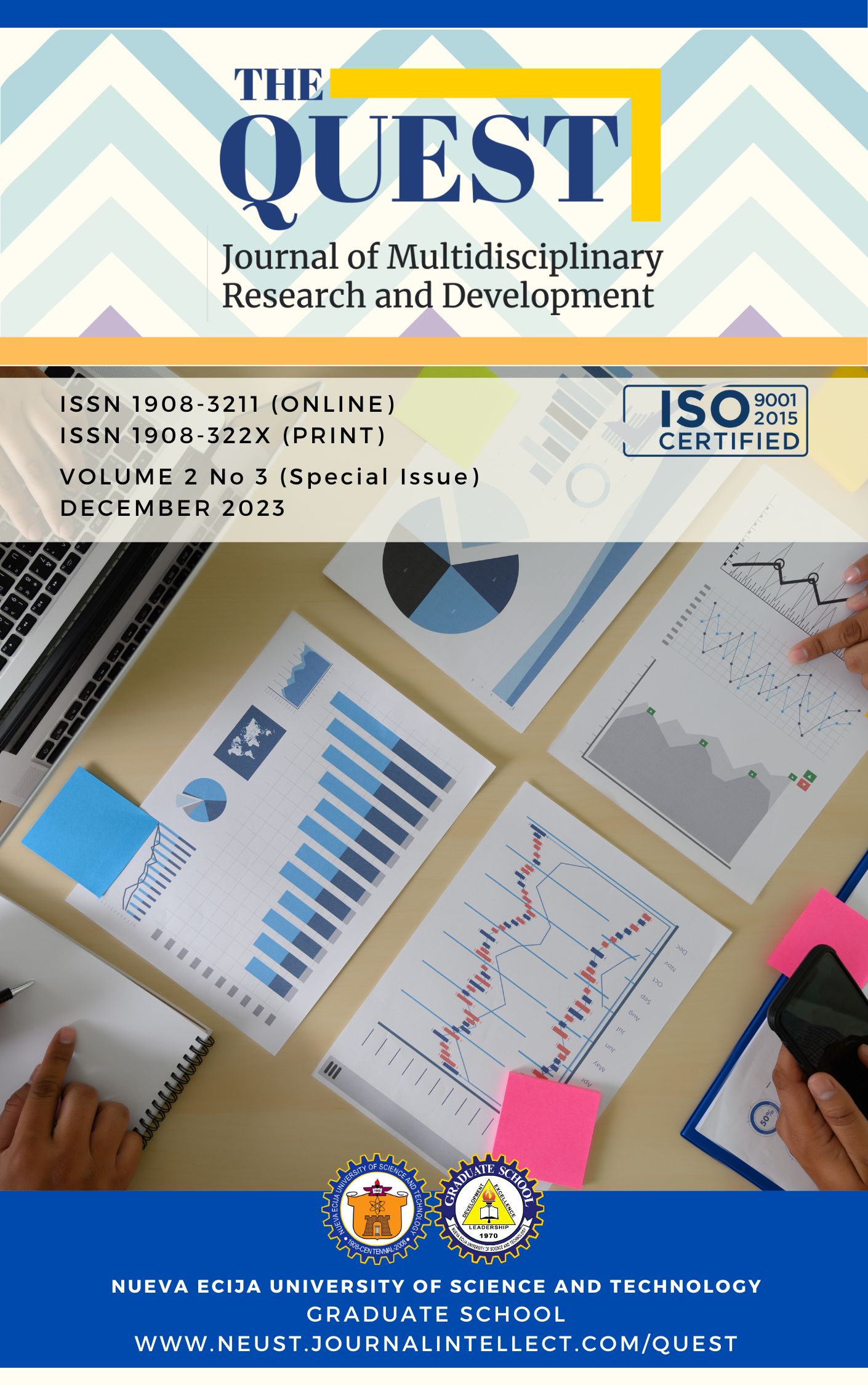Assessment and Optimizing Task Performance through Artificial Intelligence Systems in Hangzhou Ruinan Information Technology Co., Ltd

Published 12/30/2023
Keywords
- Artificial Intelligence,
- Task Performance,
- Optimization,
- Data Quality,
- User Acceptance
- Expertise,
- Scalability, Efficiency ...More
How to Cite
Copyright (c) 2023 The QUEST: Journal of Multidisciplinary Research and Development

This work is licensed under a Creative Commons Attribution-NonCommercial 4.0 International License.
Abstract
This research study employs a quantitative-descriptive approach to evaluate and enhance task performance through the utilization of Artificial Intelligence (AI) systems at Hangzhou Ruinan Information Technology Co., Ltd., a key player in the technology hub of Hangzhou City, China. The study comprises four main parts: examining AI system characteristics and provisioning, assessing actual task performance, investigating factors influencing system effectiveness, and identifying challenges impacting performance. Participants include management, IT professionals, and employees working with AI systems, providing valuable insights into system implementation and operation. Data analysis, utilizing weighted mean and verbal description techniques, offers both quantitative and qualitative perspectives on AI's role in optimizing task performance. Findings reveal strong scalability, efficient overall performance, and positive impacts on workflow processes and resource utilization. Security measures, especially in data protection, and usability aspects require attention for further enhancement. The study underscores the importance of reliable data, seamless user adoption, enhanced expertise, and consistent system performance in optimizing task performance through AI within the organization. Conclusions emphasize the need to strengthen security measures, enhance usability, and address areas for improvement. The study underscores the value of AI in achieving the organization's goal of enhancing task performance and productivity. Recommendations include initiatives to enhance data quality, streamline user acceptance, invest in employee skill development, and improve scalability and performance. These recommendations aim to guide Hangzhou Ruinan Information Technology Co., Ltd. in refining its AI systems to drive efficiency and excellence in its operations.
References
- Butenko, E. (2018). Artificial intelligence in banks today: Experience and perspectives.
- Castelo, N. (2019). Blurring the Line Between Human and Machine: Marketing Artificial Intelligence.
- Chai, X. (2020). Task scheduling based on swarm intelligence algorithms in high performance computing environment. Journal of Ambient Intelligence and Humanized Computing, 1-9.
- Das, D., & Chernova, S. (2020). Leveraging rationales to improve human task performance. Proceedings of the 25th International Conference on Intelligent User Interfaces.
- Kim, Y.G., Lee, S., Son, J.Y., Bae, H., & Chung, B.D. (2020). Multi-agent system and reinforcement learning approach for distributed intelligence in a flexible smart manufacturing system. Journal of Manufacturing Systems, 57, 440-450.
- Lai, H., Pitafi, A., Hasany, N., & Islam, T. (2021). Enhancing Employee Agility Through Information Technology Competency: An Empirical Study of China.
- O’Toole, C., & Barnes-Holmes, D. (2009). Three Chronometric Indices of Relational Responding as Predictors of Performance on a Brief Intelligence Test: The Importance of Relational Flexibility. The Psychological Record, 59, 119-132.
- Sadiku, M.N., Fagbohungbe, O., & Musa, S.M. (2020). Artificial Intelligence in Cyber Security. International Journal of Engineering Research and Advanced Technology.
- Pandey, A. K., Agarkar, P. M., Esteban, A. P. L., Selvakumar, V., Gupta, A., & Athawale, S. V. (2022). Cluster based grid computing with privacy preserving optimization using deep learning technique. International Journal of Intelligent Systems and Applications in Engineering, 10(2s), 272-275.
- Tsotsos, J.K. (1995). Behaviorist Intelligence and the Scaling Problem. Artif. Intell., 75, 135-160.
- Wang, G.Q. (2014). Research on Artificial Intelligence Technology of Electrical Automation Control. Applied Mechanics and Materials, 624, 469 - 472.
- Yu, X., & Wang, Q. (2019). Research on Intelligent Task Management and Control Mode of Space Information Networks Based on Big-Data Driven. Space Information Networks Conference.
